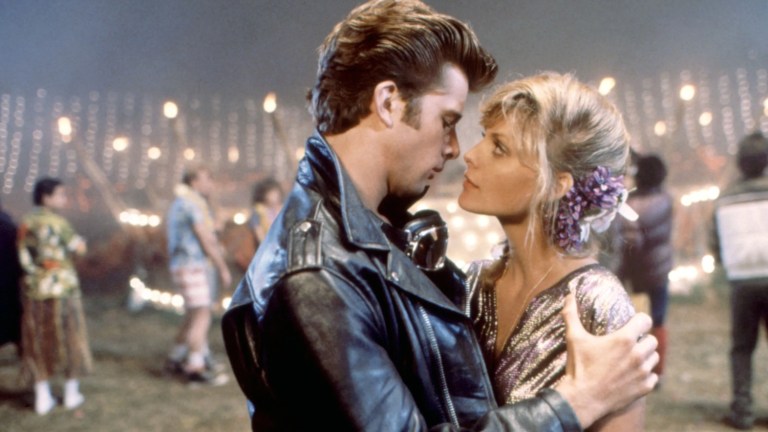Grease 2: A Cult Classic That’s Way Cooler Than The Original
We look back at Grease 2, the box office bomb-turned-cult classic, with star Maxwell Caulfield.

When I was in high school there was an unspoken rule that said you were either a superfan of The Cure or The Smiths, but not both. Looking back now, this is an invented rivalry, as both groups cover much of the same artistic ground and appeal to like-minded fans. I’ve been thinking about this theory a lot lately, because it really showcases the sort of things that feel of world-shattering importance when you are a teenager. And while I squandered much of my misspent youth dancing in my bedroom to both “Stop Me If You Think You’ve Heard This One Before” and “The Lovecats,” there was another, perhaps more consequential, pop culture face-off that caused division through the hallways of early-1990s schools everywhere: Grease or Grease 2?
As an amateur Greaseologist who spent way, way too much time plunked in front of his television watching Olivia Newton-John and John Travolta declaring each other to be the one that the other wants on the rickety floor of the Shake Shack—part of a massive carnival set up in Rydell High’s seemingly boundless stretch of land—I used to think I was firmly in the camp of the original picture. Then something more mysterious than the identity of a certain Cool Rider happened; I started to prefer Grease 2. Blasphemy you say? Perhaps. But then to make that assertion is just as ridiculous as saying that Morrissey and Robert Smith are both shiny happy people.
The biggest reason behind the derision many viewers feel toward Grease 2 —a movie which is celebrating its 40th anniversary this year (and has the new Steelbook Blu-ray to prove it)—is that Newton-John and Travolta didn’t return. Well that, and the film’s plot was a rehash that simply placed Pink Lady Stephanie (Michelle Pfeiffer in her first leading role) in the role of cool heroine while Sandy’s British cousin Michael (Maxwell Caulfield) filled the slot of the nerdy exchange student who must change his core self in order to fit in. The songs initially weren’t considered as catchy as the original film’s either, a critique that overlooked the fact that Grease’s tunes were a product of the fine-tuned Broadway machine. Furthermore, the creators of Grease, Jim Jacobs and Warren Casey, weren’t involved with the sequel at all. Instead Louis St. Louis, who provided original music for the Grease film, was back for the sequel.
Here’s the thing though: Grease 2 is smarter, funnier, more feminist (well as much as these movies can be), and has a general sense of goofiness that doesn’t get bogged down in the sludgy camp that sometimes mucks up Grease. It may have taken 40 years, but this once-maligned musical, highlighted by songs like The Four Tops’ soaring opener, “Back to School,” and the sex-ed anthem “Reproduction,” has been re-evaluated to the point that it even turns up on Turner Classic Movies occasionally. Not that anyone could have predicted this Howard the Duck-esque turn of events back in 1982.
Behind the scenes, there was pressure on first-time director Patricia Birch, who did the choreography for the first film, and on writer Ken Finkleman to somehow satisfy and exceed the massive expectations that audiences had of the project. As if all this wasn’t enough weight for one production to carry, what thin hopes there were for striking box office gold became decimated when a visitor from 3,000,000 light years upended the motion picture industry: Grease 2 and E.T.: The Extra Terrestrial both opened on June 11, 1982. Other competition at the time included Rocky III and Star Trek II: The Wrath of Khan, meaning that, to embrace a cliché, class at Rydell High was soon dismissed.
Birch never directed another feature film. Instead she continued to find success in helming music videos (she directed Cyndi Lauper’s “True Colors”) and stage productions. Writer Ken Finkleman also scripted and directed the equally underperforming Airplane II: The Sequel (also 1982) before later becoming hugely successful with his George Findley character in various Canadian TV shows. As you may have noticed, Michelle Pfeiffer weathered the storm well. The same can’t entirely be said for the film’s super producer Allan Carr (whose marketing brilliance was a huge reason behind Grease’s original success). Carr was reportedly crestfallen by Grease 2’s inability to connect with audiences.
And then there’s Maxwell Caulfield. Despite giving an engaging performance as the film’s co-lead, the future Empire Records antagonist (more on that in a minute) has had an ambivalent relationship with Grease 2 in the four decades since its initial release.
“I felt bad that Grease 2 had failed at the box office, because I felt that it had helped almost kill the movie musical genre,” Caulfield tells us during a recent interview promoting the anniversary and a new Blu-ray Steelbook release of the movie. “[It didn’t] kill it outright, but it had set it back.” He also feels that same setback impacted his own career. “Becoming a movie star is about continuing to make first class movies that make people money, because it’s show business,” Caulfield says. “But what took me years to get over Grease 2 was the failure of my career to ignite, to lead to other opportunities, to try to light up the silver screen.”
Candid and the very definition of refined and thoughtful, Caulfield also has a self-awareness that seems lacking in Hollywood today. “You come into this business knowing there’s going to be a level of rejection,” the actor says. “Not everyone gets to play in the major leagues. There’s a lot of wonderful athletes who, just for some reason, don’t have the luck that goes with the drive and the timing. They’ve got the skill, but they just don’t intersect with a time and a group of people that help them on their way.”
I remind him that he has already achieved cinematic immortality through his roles as Cool Rider Michael Carrington in Grease 2 and smarmy rocker Rex Manning in Empire Records, and while clearly appreciative, he still believes he is much more than these two characters. “I’d like to create a third character now In my maturity that achieves again some kind of iconic status, because then I’d feel I’d fulfilled my mission, which was to leave a mark,” he says. “I don’t know what that character is. I hope it’s eminent. I hope this time it is a box office hit as opposed to a cult classic.”
Whether or not Caulfield ever achieves the hat trick he’s looking for, one thing that is certain is how through cable airings, VHS, and DVD rentals—and now, a new Blu-ray—audiences have finally found Grease 2.
And so the debate over which Grease movie rages on. But between you and me, it’s this one.
